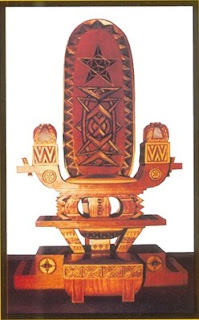Much respect follows the name Kofi Antubam, a phenomenal artist and designer from Ghana who elevated art and design and incorporated the use of traditional Adinkra symbols which, to this date, remains a trend in Ghana.
Born in 1923, Kofi was taken to Kumasi to live with his uncle at an early age when his father died, leaving his mother behind. With the support of his uncle, Kofi was able to receive an education. At an early age, Kofi showed an interest in drawing and making things, but never took these seriously until he got to Adisadel College in Cape Coast, Ghana.
Before attending school in Cape Coast, Kofi moved with his uncle’s family to Jos, Nigeria, until he gained admission into Adisadel College.

While at Adisadel College, Kofi utilized his talent until it was discovered by Father John Knight, the Principal of the College at the time, who encouraged Kofi to take his talent seriously and practise more. Father John Knight went ahead to speak with the governor of the Gold Coast at the time, Governor Arnold Hodson, who then commissioned Kofi to make a clay bust for him.
Kofi made the bust in good time and for his exceptional work, was awarded a scholarship to Achimota College to further his education. While schooling, he understudied well-known European artist Herbert Vladimir Meyerowitz amidst studying the teacher training course.
Kofi then went on to teach and sell art and painting to survive in the Gold Coast for a while before winning a scholarship to study in the UK. At the age of 25, in 1948, he left for the UK to study at the Goldsmith College, London.
Upon his return to the Gold Coast, Kofi incorporated the knowledge in sculpture and design he had acquired while in Europe with the traditional element in Ghana, but made sure that Ghana could be seen in his works. He was a true nationalist who believed in showing who one was in whatever they did.
By 1957, when Ghana had gained its independence through the efforts of Kwame Nkrumah, Antumbam had become a household name in the country. He was even named as a ‘State Artist’ by Kwame Nkrumah as a way of developing the creative arts in the country via adinkra symbols.

It was Antubam who designed the first presidential seat, the presidential mace, the state sword and many other state monuments. He was also put in charge of designing parts of the old parliament cabinet. He further designed and carved wood reliefs for various places such as Accra’s Central Library, the Ambassador Hotel and the main assembly hall of the old Parliament House. To date, several of his monuments remain at the National Museum.

In the 1960s, Kofi embarked on a cultural project which would become a book titled ‘Ghana’s Heritage of Culture’. He published this book in 1963 and exhibited some of his works in Europe and New York by the American Society.

Using traditional symbols, especially the Adinkra symbols, Antubam incorporated them into his works, giving them a unique and everlasting legacy while making the adaptation of such symbols into arts a preferred choice.
Antubam died rather young at 42 in 1964, and ever since, his legacy and contribution to his country’s creative art scene have, sadly, gone unnoticed.
A few decades after his death, several controversies concerning his artwork came up, dying after a while. Although his works have been studied, his legacy and name have been generally downplayed.










